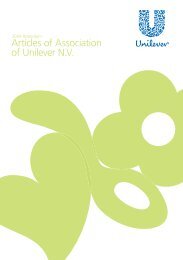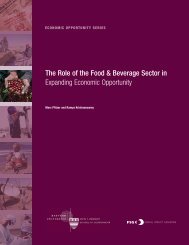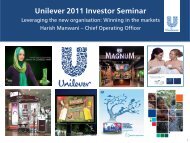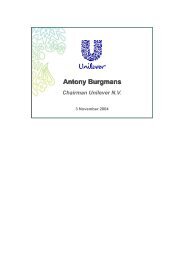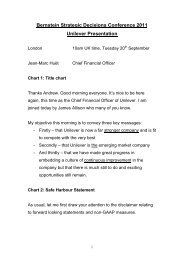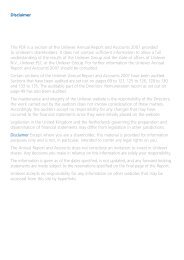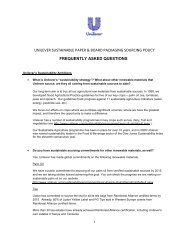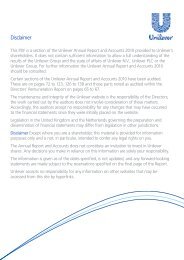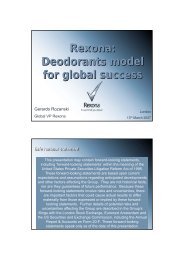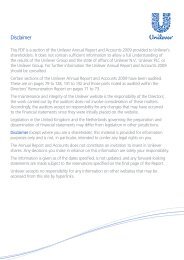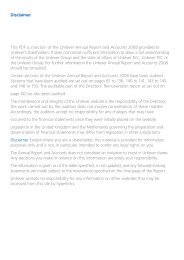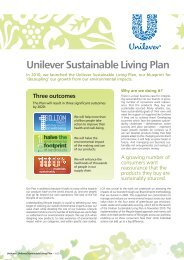Adding Insecurity to Life
Adding Insecurity to Life
Adding Insecurity to Life
Create successful ePaper yourself
Turn your PDF publications into a flip-book with our unique Google optimized e-Paper software.
Erratum Annual Report and Accounts<br />
<strong>Adding</strong> <strong>Insecurity</strong> <strong>to</strong> <strong>Life</strong>
This Erratum <strong>to</strong> the Unilever Annual<br />
Report and Accounts 2008 is provided <strong>to</strong><br />
Unilever’s shareholders by FNV Mondiaal,<br />
the international solidarity department<br />
of Dutch trade union confederation<br />
FNV and FNV Bondgenoten, the largest<br />
industry, transport and services union<br />
of The Netherlands, with the support<br />
of India Committee of The Netherlands<br />
(ICN), trade union central TUC, Britain<br />
and Britain’s biggest trade union, Unite.<br />
The cases presented in this report are<br />
based on information that is publicly<br />
available.<br />
For more information, please contact<br />
FNV Mondiaal.<br />
FNV Mondiaal<br />
P.O. Box 8456<br />
1005 AL Amsterdam<br />
The Netherlands<br />
e-mail: iz@fnv.nl<br />
www.fnv.nl/mondiaal<br />
Since Unilever launched its “Path <strong>to</strong> Growth” strategy<br />
in 1999 and <strong>to</strong>ok over Bestfoods in 2000, 192.000 jobs<br />
were cut (a decline from 339.000 employees in 2000 <strong>to</strong> 147.000 at the<br />
end of 2008). At the same time profits grew. To a large extend this has been made<br />
possible by the outsourcing and casualisation of work. The actual jobs haven’t disappeared, but production<br />
has been outsourced <strong>to</strong> reduce costs, or the workers have been dismissed and are re-hired through an<br />
agency, making them cost less.<br />
Outsourced workers are faced with<br />
• Job insecurity and an uncertain future<br />
• Low wages<br />
• Limited or no access <strong>to</strong> social benefits, such as health or pension schemes<br />
• Increased health and safety risks at work<br />
• The denial of rights at work, such as the right <strong>to</strong> join a union or bargain collectively
Contents<br />
Contents<br />
Our highlights 5<br />
Trade Union Statement 6<br />
Erratum 7<br />
1. Unilever mission statement 7<br />
2. People and Sustainability 8<br />
Mercury Poisoning in Kodaikanal, India 8<br />
The bitter taste of Indian Lip<strong>to</strong>n tea 8<br />
Pressing issues at Unilever’s (Rainforest Alliance<br />
Certified) Tea Estates in Kenya 9<br />
3. Restructuring and changes <strong>to</strong> the way we operate 11<br />
Unilever Mabole, Sri Lanka 11<br />
Unilever Pakistan 11<br />
Unilever Karachi, Pakistan 12<br />
Unilever Dharwad, India 12<br />
Unilever Assam, India 13<br />
Unilever Istanbul, Turkey 13<br />
4. Code of business principles 14<br />
Code of Business Principles trampled upon<br />
in The Netherlands 14<br />
5. Business Partner Code 14<br />
6. Labour Standards 15<br />
More information 16<br />
Colophon 16<br />
Erratum Annual Report and Accounts 3
4 Erratum Annual Report and Accounts
Our highlights Three items as in original report:<br />
Financial<br />
Profits grew<br />
while workers were not paid their legal wages<br />
• Profits grew<br />
• Executive golden handshakes and pay packets grew<br />
• Management s<strong>to</strong>ck options grew<br />
• Lip<strong>to</strong>n workers in Pakistan 100% outsourced: 800 casual workers<br />
• Tea plantation workers in India are not paid their full legal wages<br />
• Unilever Code of Conduct is not complied with in the Netherlands<br />
Social<br />
Half the global<br />
Unilever workforce are not recognized as employees<br />
• Outsourcing and casualisation have increased dramatically in the past five years<br />
• An estimated 300,000 workers are employed in the manufacture and distribution of Unilever<br />
products globally, that is nearly twice the official amount of Unilever employees. Half the<br />
workforce are not recognized as employees and Unilever does not pay them the wages and<br />
benefits that unions have successfully fought for and negotiated<br />
• Organization of workers is hindered in many countries<br />
• Unilever refuses <strong>to</strong> engage with unions at international level<br />
• Rain Forest Alliance Certification does not necessarily mean that Unilever complies fully with the<br />
social component of the certification requirements<br />
Environmental<br />
Unilever refuses<br />
<strong>to</strong> take full responsibility for clean up and compensation<br />
• Mercury poisoning scandal in Kodaikanal, India continues; Unilever refuses <strong>to</strong> take full<br />
responsibility for clean up and compensation<br />
Erratum Annual Report and Accounts 5
Trade Union statement<br />
Our strategy, in an unpredictable economic<br />
environment, is <strong>to</strong> maintain decent work for<br />
Unilever workers and <strong>to</strong> secure equal and just levels<br />
of pay for equal work.<br />
As the Unilever Sustainability Overview mentions, 43% of all<br />
“eligible” Unilever employees are member of a trade union.<br />
Trade union membership within Unilever is equivalent <strong>to</strong><br />
the national averages for the countries in which it operates.<br />
However, in developing countries like Indonesia, the number of<br />
trade union members within Unilever is far above the national<br />
average.<br />
The number of permanent Unilever employees has decreased<br />
dramatically in recent years. However, the work and the workers<br />
still exist. Work is being outsourced <strong>to</strong> third parties and Unilever<br />
workers are being forced <strong>to</strong> do the same job under worse<br />
conditions, and often without a permanent contract. As casual<br />
workers in many countries cannot be legally represented by trade<br />
unions, this policy also undermines the position of trade unions.<br />
Reports from within the trade union community show that<br />
Unilever management communicates with trade unions in a<br />
meaningful way only when these unions can show a strong<br />
presence. Where trade unions are not strong, due <strong>to</strong> various<br />
reasons, management tends <strong>to</strong> ignore them and communicates<br />
directly with the work force, or encourages the establishment of<br />
company friendly unions.<br />
Most labour disputes within Unilever tend <strong>to</strong> be national in<br />
scope and usually concern fac<strong>to</strong>ry closures and the subsequent<br />
outsourcing of personnel <strong>to</strong> third parties. Unilever chooses <strong>to</strong><br />
6 Erratum Annual Report and Accounts<br />
deal with these disputes at local level. However, although the<br />
conflicts are at the national level, similar disputes are occurring<br />
with increasing frequency all over the world, making the<br />
aggressive outsourcing policy of the company a global problem<br />
that should be dealt with at international level.<br />
Disputes also arise particularly when Unilever refuses <strong>to</strong> recognize<br />
trade unions as representatives of the work-force, intimidates<br />
workers and encourages them <strong>to</strong> establish company friendly<br />
trade unions.<br />
Unilever’s aggressive policy of job destruction and the increase<br />
in disposable jobs not only damages industrial relations. It<br />
undermines decent work where it still exists and creates an entire<br />
generation of “disposable” workers who make Unilever’s global<br />
brands but will never achieve decent work.<br />
The company’s current policy is a threat <strong>to</strong> workers in Europe,<br />
Asia and everywhere in the world. More and more Unilever<br />
workers realize what is at stake. Even the “socially responsible”<br />
plant closures in Europe, with decent compensation for workers,<br />
leave us with no decent jobs for the next generation, no social<br />
protection, no employment security and no future. We need<br />
<strong>to</strong> build our own Path. Only our growing resistance <strong>to</strong> casual<br />
and insecure jobs will ensure real, long-term socially sustainable<br />
growth.<br />
With this Erratum <strong>to</strong> the Annual report and Accounts, we aim <strong>to</strong><br />
inform Unilever shareholders and other interested parties of the<br />
full s<strong>to</strong>ry behind the good revenues and efficient restructuring<br />
processes. It is not just about numbers, it is about people,<br />
real employees of Unilever or other companies that produce<br />
Unilever brand products, who are being treated in a way that is<br />
not worthy of Unilever and some of whom are not even being<br />
paid enough <strong>to</strong> be able <strong>to</strong> enjoy the luxury of buying Unilever<br />
products themselves.<br />
Peter Gortzak<br />
President FNV Mondiaal<br />
With the support of TUC and Unite<br />
Henk van der Kolk<br />
President FNV Bondgenoten
Erratum<br />
1. Unilever mission statement<br />
On the contents page<br />
Unilever’s mission:<br />
Unilever’s mission is <strong>to</strong> add Vitality <strong>to</strong> <strong>Life</strong>. We meet everyday<br />
needs for nutrition, hygiene and personal care with brands that<br />
help people feel good, look good and get more out of life.<br />
Should be:<br />
Unilever’s mission is <strong>to</strong> add <strong>Insecurity</strong> <strong>to</strong> <strong>Life</strong>. We meet everyday<br />
needs for nutrition, hygiene and personal care with brands that<br />
help people feel good, look good and get more out of life, by<br />
denying decent working conditions <strong>to</strong> disposable workers.<br />
POVERTy AND INEqUALITy<br />
AT THE KHANEWAL LIPTON TEA FACTORy<br />
22<br />
permanent workers<br />
Paid annual leave yes No<br />
Paid public holidays yes No<br />
Paid sick leave yes No<br />
Paid emergency leave yes No<br />
Medical benefits/insurance yes No<br />
Death benefits yes No<br />
Annual bonus yes No<br />
Overtime pay rates yes No<br />
Right <strong>to</strong> join the union at Unilever yes No<br />
Covered by Collective Agreement yes No<br />
723<br />
contract agency workers<br />
Erratum Annual Report and Accounts 7
Erratum<br />
2. People and Sustainability<br />
On page 21<br />
Unilever’s text:<br />
Unilever has for many years recognised the significance of<br />
social and environmental issues as a critical dimension of its<br />
operations, and has established many indica<strong>to</strong>rs <strong>to</strong> track its<br />
performance in these areas. We regard safety as an essential<br />
element of a successful and sustainable business and take<br />
seriously our responsibility <strong>to</strong> provide a safe workplace. We aim<br />
<strong>to</strong> improve continuously the health, safety and well-being of<br />
everyone working for or on behalf of Unilever. A key measure<br />
of our progress in this area is our <strong>to</strong>tal recordable accident<br />
frequency rate, which counts all workplace accidents except<br />
those requiring only simple first aid treatment. For details please<br />
refer <strong>to</strong> page 13.<br />
We are committed <strong>to</strong> meeting the needs of cus<strong>to</strong>mers and<br />
consumers in an environmentally sound and sustainable<br />
manner, through continuous improvement in environmental<br />
performance in all our activities. We exercise the same concern<br />
for the environment wherever we operate and aim <strong>to</strong> reduce<br />
the environmental footprint of our business and brands.<br />
Should be:<br />
We are NOT as committed as we should be <strong>to</strong> meeting the<br />
needs of cus<strong>to</strong>mers and consumers in an environmentally sound<br />
and sustainable manner, through continuous improvement in<br />
environmental performance in all our activities. We do not<br />
show the same concern for the environment or for the<br />
welfare of the inhabitants of that environment wherever<br />
we operate. We aim <strong>to</strong> reduce the environmental footprint of<br />
our business and brands. However, the standards we adhered <strong>to</strong><br />
in Europe and other developed countries are not adhered <strong>to</strong> in<br />
the same way in other regions.<br />
Mercury Poisoning in Kodaikanal, India<br />
Unilever’s former thermometer fac<strong>to</strong>ry in Kodaikanal India<br />
caused harm <strong>to</strong> workers’ health and the environment. In 2001,<br />
Greenpeace and Palni Hills Conservation Council reported that<br />
Hindustan Lever, a subsidiary of Unilever, dumped 7.4 <strong>to</strong>nnes of<br />
glass waste contaminated with mercury behind the fac<strong>to</strong>ry on<br />
land leading <strong>to</strong> the Pambar Shola forest. In the same year, the<br />
fac<strong>to</strong>ry was closed after intense campaigning by NGOs.<br />
In 2008, protests in India and other countries and representations<br />
by stakeholders urged the company <strong>to</strong> take full responsibility<br />
for this damage <strong>to</strong> the environment. Pressure from civil society<br />
organisations resulted in Hindustan Unilever Limited (HUL)<br />
sending 300 kg of earth contaminated with mercury <strong>to</strong> the USA<br />
for treatment. However the company refuses <strong>to</strong> clean up<br />
a far larger amount of mercury that is still present in the<br />
soil and water of Kodaikanal. According <strong>to</strong> the Corporate<br />
Accountability Desk (CAD), a grass roots group from India: “HUL<br />
has managed <strong>to</strong> lobby the Tamil Nadu Pollution Control Board <strong>to</strong><br />
lower the trigger levels for clean up from 10 mg/kg (which is the<br />
Dutch soil clean-up standard for residential areas) <strong>to</strong> 25 mg/kg<br />
displaying its racist outlook on clean-up requirements. Earlier, in<br />
2002, the TNPCB had observed that 25 mg/kg was <strong>to</strong>o high, and<br />
that in the absence of an Indian standard, the Dutch standard<br />
8 Erratum Annual Report and Accounts<br />
(because Unilever is a Dutch company) should be used. This order<br />
was reversed after Unilever used a pliant research organisation<br />
(National Environmental Engineering Research Institute) <strong>to</strong><br />
‘convince’ the Board that 25mg/kg is good enough for India.”<br />
CAD will challenge this decision in the TNCPB and elsewhere.<br />
Another grass roots group from India, the Welfare Association<br />
(WA), is still seeking adequate compensation and measures by<br />
HUL both in and outside national courts. They are demanding<br />
among other things compensation for health damage and new<br />
infrastructure for long-term medical moni<strong>to</strong>ring and treatment<br />
for mercury exposed workers and immediate families.<br />
The bitter taste of Indian Lip<strong>to</strong>n tea<br />
Tea estates producing for Unilever deny workers their legal rights<br />
“your small cup of tea can make a big difference”. With<br />
this slogan Lip<strong>to</strong>n, Unilever’s premium tea brand, has been<br />
promoting its commitment <strong>to</strong> source all its tea from sustainable<br />
ethical sources. By obtaining certification from the international<br />
conservation organization Rainforest Alliance, Unilever aims <strong>to</strong><br />
ensure that the tea plantations delivering <strong>to</strong> the Lip<strong>to</strong>n brand<br />
operate according <strong>to</strong> high social and environmental standards.<br />
In December 2008, Lip<strong>to</strong>n announced that eight tea estates<br />
in the Nilgiri Hills in South India, important suppliers <strong>to</strong> the<br />
Lip<strong>to</strong>n brand, had gained Rainforest Alliance certification. In a<br />
written statement, Lip<strong>to</strong>n claimed that these estates earned the<br />
certificate “by reducing waste and pesticide use, conserving soil<br />
quality, protecting wildlife and paying employees a good wage”.<br />
However an inspection in April 2009 found that many of these<br />
claims are false.<br />
While the eight Indian plantations have made good<br />
progress on environmental aspects by reducing water<br />
pollution and the spraying of agrochemicals, the workers<br />
are not receiving the minimum wage <strong>to</strong> which they are<br />
entitled according <strong>to</strong> law in Tamil Nadu, the South Indian<br />
state in which the Lip<strong>to</strong>n suppliers are located.<br />
The legally required minimum amount which the tea pickers and<br />
tea fac<strong>to</strong>ry workers should receive is 115 rupees (approximately<br />
€ 1.75 per day). A wage agreement reached with the Nilgiri<br />
Planters Association (NPA), which includes the employers at<br />
the eight estates producing for Lip<strong>to</strong>n, sets pay at exactly 115<br />
rupees. So at first sight everything seems fine. However, the NPA<br />
has played a clever trick designed <strong>to</strong> avoid paying the legally<br />
required minimum wage. Instead of paying the 115 rupees as<br />
a basic wage, the NPA planters and estate owners only pay 86<br />
rupees as a basic wage. The other 29 rupees are paid as daily<br />
allowance and terrain allowance. The trick is that the employers<br />
are not paying any benefits, such as contributions <strong>to</strong> pension<br />
funds, in addition <strong>to</strong> these allowances, although they are legally<br />
obliged <strong>to</strong> pay such benefits on any amount paid as basic wage.<br />
In other words, the law says that employers should pay any<br />
allowances on <strong>to</strong>p of the basic wage of 115 rupees and not<br />
instead of the basic wage. But they are not doing this.<br />
According <strong>to</strong> the Nilgiri Estate Workers Union, the consequent<br />
loss of income for workers can be extremely high. The union<br />
calculated that a 60 year old worker who worked on the<br />
plantation for 40 years loses around 15,000 rupees on his<br />
pension as a result of the way that the NPA bends the rules.
Fifteen thousand rupees is a large sum in India, equivalent <strong>to</strong> half<br />
a year’s wages for a plantation worker.<br />
Already, in June 2008, the government of Tamil Nadu announced<br />
that NPA’s creative accounting is not allowed. In August 2008,<br />
this was followed by a High Court order urging the NPA and<br />
other employers <strong>to</strong> pay the normal minimum wage of 115<br />
rupees. Furthermore, one of the “critical criteria” that the<br />
Rainforest Alliance requires for certification is that “workers must<br />
receive workers pay in legal tender greater than or equal <strong>to</strong> the<br />
regional average or the legally established minimum wage.”<br />
In spite of all this, neither Unilever nor the owners of the eight<br />
certified estates have so far taken any action <strong>to</strong> correct the<br />
situation and ensure that workers are paid the correct amount.<br />
Unilever seems <strong>to</strong> be more interested in boasting about its<br />
performance in the field of corporate social responsibility<br />
(CSR). On its homepage, Unilever boasts that the tea estates in<br />
the Nilgiri region delivering <strong>to</strong> Lip<strong>to</strong>n provide free healthcare,<br />
housing, childcare and education. While this is all true, what<br />
Unilever does not say is that all these facilities are required by<br />
Indian law, are common on all tea plantations in India and are<br />
partly paid for by the government.<br />
Meanwhile, the 2500 employees working on the Nilgiri tea<br />
plantations continue <strong>to</strong> suffer. Over the last two years, food<br />
prices in the region went up by more than 40%, while wages<br />
increased by less.<br />
As long as Unilever is not giving the workers their full rights and<br />
decent pay, there is no reason <strong>to</strong> cheer about Lip<strong>to</strong>n’s Rainforest<br />
Alliance certified tea from India.<br />
For more information see:<br />
www.lip<strong>to</strong>ninindia.wordpress.com<br />
Pressing issues at Unilever’s (Rainforest Alliance Certified)<br />
Tea Estates in Kenya<br />
Unilever is the world’s leading tea company. It could therefore be<br />
expected that it would also be responsible enough <strong>to</strong> take a lead<br />
in addressing the problems of the much troubled tea sec<strong>to</strong>r. In<br />
2008, research organisation SOMO published a report entitled<br />
“Sustainability issues in the tea sec<strong>to</strong>r”, which addressed the<br />
critical issues facing the sec<strong>to</strong>r: “working conditions for pickers<br />
are often poor, with low wages, low job and income security,<br />
discrimination along ethnic and gender lines, lack of protective<br />
gear and inadequate basic facilities such as housing and<br />
sometimes even drinking water and food. At the same time there<br />
is no possibility for tea plantation workers <strong>to</strong> improve working<br />
conditions because trade unions are ineffective or absent and/or<br />
are not representing them because most of them are temporary<br />
workers. While tea production by smallholders is growing<br />
worldwide, their situation is often problematic because the prices<br />
they are paid for fresh tea leaves tend <strong>to</strong> be below the cost of<br />
production, among other fac<strong>to</strong>rs. The sec<strong>to</strong>r’s environmental<br />
footprint is considerable, with reduced biodiversity as the result<br />
of habitat conversion, high energy consumption (mainly using<br />
logged timber) and a high application of pesticides in some<br />
countries.” In Dutch media coverage of the SOMO report,<br />
Unilever for the first time publicly acknowledged these issues.<br />
The company said it was taking a new approach <strong>to</strong> these issues<br />
and that all its tea would be certified by the Rainforest Alliance<br />
by 2015. In 2007, it had sought and received worldwide media<br />
coverage for this change in its CSR tea strategy, which included,<br />
among other things, the Ethical Tea Partnership.<br />
SOMO’s tea sec<strong>to</strong>r report and its “Unilever overview of<br />
controversial practices 2007” outlined specific problems<br />
pertaining <strong>to</strong> Unilever’s tea supply chain. The latter publication<br />
looked at case studies of the Indonesian and Kenyan tea<br />
sec<strong>to</strong>r carried out by SOMO partners and concluded: “Suffice<br />
it <strong>to</strong> say here that in our opinion Unilever so far has not dealt<br />
Erratum Annual Report and Accounts 9
Erratum<br />
appropriately with the serious issues raised in these reports such<br />
as discrimination, sexual harassment, low wages and bad living<br />
conditions be it within their company or at suppliers. Admittedly<br />
these issues are delicate and some of them are difficult <strong>to</strong><br />
address. yet the company stance, somewhat fatalistic as regards<br />
Indonesia and reluctant as regards Kenya, does not inspire much<br />
confidence that they will be working <strong>to</strong>wards finding solutions <strong>to</strong><br />
these issues soon.”<br />
The field research sample for the case studies prepared for<br />
the SOMO tea report above included plantations in Indonesia<br />
and Kenya that since 2007 and 2008 have become Rainforest<br />
Alliance certified. Early 2009, the Kenyan Human Rights<br />
Commission, a Kenyan NGO, interviewed a number of workers<br />
from the same plantations in Kenya, <strong>to</strong> assess whether there<br />
were any improvements. They found that, with respect <strong>to</strong><br />
working conditions, nothing has changed for the better (after RA<br />
certification) at Kenyan Unilever estates.<br />
These were the major findings:<br />
• Discrimination against women (sexual harassment and<br />
compulsory pregnancy tests) is still rampant.<br />
• Women that are found pregnant will not get hired.<br />
• Medical tests for workers are manda<strong>to</strong>ry<br />
• Allegations of tribalism, nepotism and corruption that<br />
determine promotions and employment<br />
• Some workers complain of harsh treatment by supervisors<br />
• Overtime is an issue many of the workers interviewed<br />
report, working 11 hours a day 6 days a week. There are<br />
also indications that overtime is not voluntary because when<br />
10 Erratum Annual Report and Accounts<br />
refusing you would risk loosing your job. In all but one case<br />
overtime is paid.<br />
• The estate houses can still be overcrowded. This seems <strong>to</strong><br />
apply <strong>to</strong> seasonal workers (the majority) only. Housing repairs<br />
tend <strong>to</strong> take a very long time.<br />
• There still is no adequate complaint mechanism in place, <strong>to</strong><br />
deal effectively with worker problems<br />
• Supervisors inform workers of upcoming audit visits. Workers<br />
report that (new) personal protective equipment (PPE) is<br />
provided <strong>to</strong> workers only for this occasion.<br />
• Most of the workers interviewed are unaware of (RA)<br />
certification<br />
At least a number of these issues such as discrimination, harsh<br />
treatment/harassment and absence of a complaints mechanism,<br />
are violations of RA standards, key ILO labour standards and<br />
Unilever’s own business code of principles.<br />
For more information see:<br />
http://www.rainforest-alliance.org/agriculture/documents/<br />
sust_ag_standard.pdf<br />
http://www.unilever.com/aboutus/purposeandprinciples/<br />
urprinciples/
3. Restructuring and changes <strong>to</strong><br />
the way we operate<br />
On page 27<br />
Unilever’s text:<br />
Restructuring is an integral part of remaining competitive, and<br />
this can involve changes <strong>to</strong> internal structures, the rationalisation<br />
of the asset base, and the use of third parties <strong>to</strong> deliver business<br />
services.<br />
Should be:<br />
Restructuring is an integral part of Unilever’s strategy. Unilever’s<br />
aggressive policy of job destruction and the increase in disposable<br />
jobs not only damages industrial relations. It undermines decent<br />
work where it still exists and creates an entire generation of<br />
‘disposable’ workers who make Unilever’s global brands but will<br />
never achieve decent work.<br />
ThE MAgIC TRICk OF ThE DISAPPEARINg JObS<br />
1981 2008<br />
Turnover 25.5 million € 40.187 million €<br />
Turnover in developing and emerging markets 20% 47%<br />
Employees 292,000 174,000<br />
Employees in Europe 167,000 32,000<br />
Employees in other regions 125,000 142,000<br />
Total estimated number of people who produce Unilever<br />
products but who are not directly employed by Unilever<br />
Examples of how Unilever’s restructuring and casualisation policy<br />
is affecting Unilever workers worldwide are:<br />
Unilever Mabole, Sri Lanka<br />
In 2002, the IUF-affiliated CMU led a long fight against the<br />
closure of Unilever’s Lip<strong>to</strong>n plant in Mabole, Sri Lanka, which<br />
saw 500 jobs eliminated. Unilever blamed the closure on,<br />
alternately, high labour costs and… their inability <strong>to</strong> import teas<br />
for blending. Challenged on the grounds for the closure, the<br />
company stated “Unilever Ceylon built a successful business in<br />
Sri Lanka by consistently investing in people, by gaining deep<br />
insight in<strong>to</strong> consumers, by investing heavily in establishing<br />
strong brands that are now part of everyday lives of Sri Lankans<br />
and by developing a distribution system envied and replicated by<br />
competi<strong>to</strong>rs. We are not about <strong>to</strong> give this up.” They disposed<br />
of the people, but didn’t give up making tea – the jobs were<br />
simply outsourced.<br />
300,000<br />
Unilever Pakistan<br />
Since 2004, when Unilever Pakistan sold its Dalda brand plant<br />
manufacturing edible oils and spreads in Karachi <strong>to</strong> a group of<br />
former company managers incorporated as Dalda Foods (Pvt.)<br />
Limited, Dalda has made both the former Unilever Dalda line<br />
of edible oils and Unilever’s trademark Blue Band margarine. In<br />
this fac<strong>to</strong>ry, which produces Unilever’s billion dollar brand Blue<br />
Band under license, there are no permanent workers. Over 430<br />
workers signed up as members of the Dalda Food Employees<br />
Union <strong>to</strong> fight for the right <strong>to</strong> permanent employment. The<br />
union applied for official registration with the authorities on 13<br />
May 2008. Just a week later, while Unilever management were<br />
coming and going from the fac<strong>to</strong>ry, 266 union members were<br />
illegally dismissed. A protest camp was set up outside the fac<strong>to</strong>ry<br />
with support from the IUF-affiliated National Federation of<br />
Food, Beverage and Tobacco Workers. The workers are receiving<br />
daily support for their vigil from the Federation and from other<br />
trade union organizations alert <strong>to</strong> the central importance of the<br />
struggle against mass casualisation and outsourcing.<br />
Erratum Annual Report and Accounts 11
Erratum<br />
qUIZ – salaries at Unilever<br />
Paul Polman <strong>to</strong>ok the helm at Unilever on<br />
Oc<strong>to</strong>ber 1 2008. He received a basic salary<br />
of €292.000 plus a €438.000 bonus for<br />
his three month induction period. This<br />
bonus was part of his contract and was<br />
not subject <strong>to</strong> a performance requirement.<br />
To get him on board, Unilever paid<br />
Polman €970.000 for the effort of signing<br />
his contract.<br />
Polman started his job as chief executive<br />
officer on 1 January 2009. by that time,<br />
he had already received € 1.7 million, for<br />
the three months he worked in 2008.<br />
Tea workers at the Khanewal tea fac<strong>to</strong>ry<br />
in Pakistan, received €177 for their three<br />
Unilever Karachi, Pakistan<br />
Another Unilever plant in Pakistan, Lip<strong>to</strong>n Karachi, employed<br />
122 permanent workers and 450 casual workers sourced from<br />
employment agencies. The number of permanent workers<br />
was apparently deemed <strong>to</strong> be <strong>to</strong>o high, so production was<br />
transferred <strong>to</strong> a warehouse around the corner, employing 100%<br />
outsourced, casual workers. In Pakistan, that left the Lip<strong>to</strong>n<br />
fac<strong>to</strong>ry in Khanewal, Punjab, as the last directly owned and<br />
operated Lip<strong>to</strong>n plant in a nation of tea drinkers. At Khanewal,<br />
there are 22 permanent workers, and 723 workers sourced<br />
from employment agencies. Determined <strong>to</strong> challenge a regime<br />
that pays casuals one third the daily wage of the permanent<br />
employees and offers no job security, no overtime pay, and<br />
no health and social security benefits, the workers formed the<br />
Unilever Mazdoor Union khanewal. On 28 January 2009 the<br />
Khanewal workers marched from the fac<strong>to</strong>ry gate <strong>to</strong> the district<br />
labour office <strong>to</strong> demand that the law be respected. Pakistan’s<br />
legislation states that workers with nine months of continuous<br />
service must be granted permanent status. Workers have been<br />
employed at Khanewal, on average, for 15 years, and in some<br />
case many more.<br />
12 Erratum Annual Report and Accounts<br />
months of work. But only if they had<br />
worked at least 26 days of each month.<br />
If they did not work 26 days, they only<br />
received €2.32 as a daily wage.<br />
Quiz question: The new Unilever CEO<br />
received €1.7 million for his three month<br />
induction period in 2008. A contract<br />
worker at the Unilever tea fac<strong>to</strong>ry in<br />
Pakistan receives €59 a month if he works<br />
at least 26 days per month.<br />
How many months of at least 26 days<br />
should a tea worker work <strong>to</strong> earn even<br />
the monthly income of his Chief Executive<br />
Officer (CEO)? (you can find the answer<br />
<strong>to</strong> this question on the following page.)<br />
Paul Polman (Enschede, The Netherlands,<br />
1956. Son of an employee of car tire fac<strong>to</strong>ry<br />
Vredestein): “Seek first <strong>to</strong> understand then <strong>to</strong> be<br />
unders<strong>to</strong>od” (FEM Business, september ‘08)<br />
In response <strong>to</strong> growing international pressure, on April 15 2009<br />
Unilever management in Pakistan formally met with a IUF/<br />
NFFBTW delegation <strong>to</strong> discuss the situation at the Khanewal<br />
Lip<strong>to</strong>n plant. The management argued that business logic meant<br />
that only a small number of workers can have permanent jobs<br />
at the plant and other workers should be “replaceable”. While<br />
the fact that management has agreed <strong>to</strong> open negotiations is<br />
positive, the company position remains unacceptable.<br />
Unilever Dharwad, India<br />
It <strong>to</strong>ok eight years of struggle after the illegal closure of Unilever<br />
India’s fac<strong>to</strong>ry in Dharwad in Karnataka state, for 42 workers<br />
<strong>to</strong> finally receive compensation in accordance with a Labour<br />
Court ruling against the company. The s<strong>to</strong>ry of Dharwad<br />
shows how Unilever management is adept at fabricating the<br />
conditions for fac<strong>to</strong>ry closure, involving a complex web of lies<br />
and deceit that often takes years <strong>to</strong> uncover in the courts. The<br />
Dharwad fac<strong>to</strong>ry was established in 1993 as an independent<br />
subsidiary of Hindustan Lever. When the fac<strong>to</strong>ry first opened in<br />
this “backward” rural area in Dharwad it was granted extensive<br />
tax concessions. In January 1999, once the tax concessions<br />
ended, management set about secretly closing the fac<strong>to</strong>ry over<br />
the next 12 months. Half the machinery and production was<br />
transferred <strong>to</strong> other Hindustan Lever units, while the workers<br />
were rendered “surplus” and given menial manual tasks like<br />
cutting the grass and other odd jobs. All supervisors, production<br />
officers, technical officers, and accounts officers were transferred<br />
<strong>to</strong> other units of the company. On 11 March 2000 all operations<br />
at the fac<strong>to</strong>ry ceased. Over the next eight months the union<br />
fought back, finally winning an agreement with management in<br />
Oc<strong>to</strong>ber 2000. But within 24 hours, management undermined<br />
the agreement and tried <strong>to</strong> back out of its commitments. There<br />
followed a seven-year battle in the courts with the union over<br />
the illegal closure of the fac<strong>to</strong>ry and the illegal termination of<br />
employment of the remaining 42 union members.
The answer <strong>to</strong> our quiz question on the previous page is: a worker at the tea fac<strong>to</strong>ry in Pakistan should work 9.605 months <strong>to</strong> earn the CEO’s<br />
monthly salary. This requires more than 800 years working non-s<strong>to</strong>p. (FNV Bondgenoten argues that a CEO should not earn more than twenty times<br />
the lowest wage paid in that company.)<br />
Unilever Assam, India<br />
In 2007, management at the Unilever fac<strong>to</strong>ry in the Doom<br />
Dooma Industrial Estate in the north eastern state of Assam,<br />
India, was trying <strong>to</strong> smash the Hindustan Lever Workers Union<br />
by locking out its 700 members and creating a fake union.<br />
Management’s condition for ending the lockout is that the<br />
legitimate union must be disbanded and that all workers transfer<br />
their membership <strong>to</strong> the new union created by management.<br />
The dispute began when management withheld payment of<br />
an allowance that was <strong>to</strong> be paid <strong>to</strong> all union members. It was<br />
soon clear that management had no intention of negotiating,<br />
but was simply using the allowance dispute <strong>to</strong> smash the<br />
union. In response <strong>to</strong> this attempt, a mass sit-in protest by 700<br />
union members was held for three days starting 3 August.<br />
Over 100 union members held a protest at Assembly Hall, the<br />
local parliament. Support has come from student, youth and<br />
social organisations, who are putting pressure on Unilever<br />
management <strong>to</strong> end the lock-out.<br />
Unilever Istanbul, Turkey<br />
Workers’ protests spread around the globe. Throughout 2008,<br />
87 workers were on picket line <strong>to</strong> protest at illegal dismissals at<br />
two Unilever exclusive subcontrac<strong>to</strong>rs Çipa and S¸ims¸ek at the<br />
Unilever distribution centre near Istanbul, Turkey. Three national<br />
unions of transport, chemical and food workers and Türk-Is<br />
confederation and the three international Union federations ITF,<br />
IUF and ICEM supported their struggle.<br />
Unilever Beigel & Beigel fac<strong>to</strong>ry in the West Bank<br />
In December 2008 Unilever announced that it will divest<br />
from an Israeli fac<strong>to</strong>ry in a Jewish settlement, illegally<br />
built on land confiscated from Palestinians. Unilever<br />
Israel, which bought half of Beigel & Beigel in 2001,<br />
said the move was strategic, not ethical. The fac<strong>to</strong>ry<br />
is located in Barkan, an industrial zone in Ariel. Until<br />
this moment (April 2009) Unilever did not confirm that<br />
the disinvestment actually <strong>to</strong>ok place. questions about<br />
the consequences for employees and on who the new<br />
owners might be, repeatedly posed <strong>to</strong> Unilever by,<br />
amongst others, United Civilians for Peace, have yet <strong>to</strong> be<br />
answered.<br />
Erratum Annual Report and Accounts 13
Erratum<br />
4. Code of business principles<br />
On page 75<br />
Unilever’s text:<br />
Unilever’s Code of Business Principles sets out the standards of<br />
conduct <strong>to</strong> which we expect our employees <strong>to</strong> adhere.<br />
Should be added <strong>to</strong> with:<br />
Although the Code of Business Principles is globally applicable,<br />
Unilever chooses when and where it should be applied. One<br />
example:<br />
Code of Business Principles trampled upon in The<br />
Netherlands<br />
Unilever does not comply with its own Code of Business<br />
Principles in The Netherlands. For example, it is not complying<br />
with agreements made with the Dutch trade unions. FNV<br />
Bondgenoten is now seeking justice through the legal system.<br />
The two most urgent issues are:<br />
Unilever refuses <strong>to</strong> pay for research in<strong>to</strong> the viability and<br />
future of the Unox fac<strong>to</strong>ry<br />
The Agreement on Principles of the new collective labour<br />
agreement, signed on 8 November 2007, stated that both the<br />
trade union and the Works Council would receive the results of<br />
‘Project Hercules’, a Unilever study about reducing the numbers<br />
of indirectly employed workers. The Agreement on Principles also<br />
gave the trade union and the Works Council the right <strong>to</strong> conduct<br />
their own research, which would be paid for by Unilever.<br />
Unilever has now informed Dutch union FNV Bondgenoten<br />
that it does not intend <strong>to</strong> pay for this research. This leaves FNV<br />
Bondgenoten with no other choice than <strong>to</strong> bring the case <strong>to</strong><br />
court. FNV Bondgenoten wants <strong>to</strong> complete this research in<br />
order <strong>to</strong> assess what might be necessary <strong>to</strong> keep Unox viable,<br />
both now and in the future. The union does not wish <strong>to</strong> depend<br />
on the information it receives from Unilever management.<br />
Unilever changes conditions for covering costs of personal<br />
development training<br />
According <strong>to</strong> a Unilever letter <strong>to</strong> FNV Bondgenoten, it appears<br />
that the company does not intend <strong>to</strong> continue funding personal<br />
development of staff. A budget of €3000 per person for 2007<br />
and 2008 was hardly used because Unilever refused most staff<br />
requests <strong>to</strong> make use of their personal development budget,<br />
usually on the inappropriate grounds that the collective labour<br />
agreement had not yet been signed.<br />
Unilever has taken back the complete budget for 2007 and<br />
2008 and practically nobody has had the chance <strong>to</strong> use it.<br />
According <strong>to</strong> Unilever, staff members are allowed <strong>to</strong><br />
make a request for a personal development<br />
budget in 2009, but only under new<br />
conditions that were not agreed by the<br />
collective labour agreement.<br />
14 Erratum Annual Report and Accounts<br />
5. Business Partner Code<br />
On page 75<br />
Unilever’s text:<br />
Unilever’s Business Partner Code sets the standards that we<br />
expect of suppliers in areas such as health and safety at work,<br />
business integrity, respect for labour standards, consumer<br />
safety and safeguarding the environment. Unilever’s supply<br />
management function is responsible for the roll-out of the<br />
Business Partner Code and for gaining supplier assurance.<br />
Should be added <strong>to</strong>:<br />
Unfortunately, moni<strong>to</strong>ring of compliance with our<br />
Business Partner Code is carried out using self-<br />
assessment forms that we ask our suppliers <strong>to</strong><br />
complete, and occasionally by internal audits.<br />
This of course does not provide us with adequate<br />
information on working conditions and on<br />
environmental and social aspects. Independent<br />
auditing of our suppliers by an external specialised<br />
organisation is required.
6. Labour Standards<br />
On page 75<br />
Unilever’s text:<br />
Between 2006 and 2008, four complaints have been brought <strong>to</strong><br />
Unilever’s attention by the International Union of Food Workers<br />
(IUF) and the transport union TUMTIS. These concern site closure,<br />
freedom of association, collective bargaining and the use of<br />
temporary and contracted labour at our fac<strong>to</strong>ries in India and<br />
Pakistan and a supplier’s fac<strong>to</strong>ry in Turkey. Under the terms of<br />
the OECD’s Guidelines for Multinational Enterprises, the unions<br />
have referred their complaints <strong>to</strong> the OECD’s national contact<br />
points in the UK and Turkey for investigation. Unilever is seeking<br />
local resolution <strong>to</strong> these issues as well as co-operating fully with<br />
the OECD process.<br />
Should be:<br />
Between 2006 and 2008, four complaints have been brought <strong>to</strong><br />
Unilever’s attention by the International Union of Food Workers<br />
(IUF) and the transport union TUMTIS. These concern site closure,<br />
freedom of association, collective bargaining and the use of<br />
temporary and contracted labour at our fac<strong>to</strong>ries in India and<br />
Pakistan and a supplier’s fac<strong>to</strong>ry in Turkey. Under the terms of the<br />
OECD’s Guidelines for Multinational Enterprises, the unions<br />
have referred their complaints <strong>to</strong> the OECD’s national<br />
contact points in the UK and Turkey for investigation.<br />
Unilever is seeking local resolution of these<br />
issues instead of referring <strong>to</strong> its global Code<br />
of Business Principles and addressing these<br />
problems in a global context. Unilever<br />
also does not refrain from exerting strong<br />
pressure on the workers and the unions<br />
involved.<br />
Pakistani workers, Zafar Iqbal and Abdul Hameed – thrown out<br />
after 30 years<br />
In August 2008 Zafar Iqbal and Abdul Hameed, were dismissed from their jobs at the<br />
Unilever Lip<strong>to</strong>n fac<strong>to</strong>ry in Khanewal after working for 30 years. They received no pension or<br />
retirement benefits. For the remaining 700 workers the message is clear: this is your future<br />
<strong>to</strong>o! Zafar Iqbal and Abdul Hameed: “30 years making Lip<strong>to</strong>n tea, on minimum wages and<br />
long hours, not knowing whether there will be work from one day <strong>to</strong> the next, turning<br />
out a billion-dollar brand for<br />
Unilever but not formally<br />
employed by Unilever, then<br />
thrown out like a used-up<br />
Lip<strong>to</strong>n tea bag, everything<br />
drained out of you, with<br />
nothing.”<br />
Erratum Annual Report and Accounts 15
More information<br />
www.gewoongoedwerk.nl<br />
www.debrugwachters.com<br />
www.unileverwatch.org<br />
www.iuf.org/casualtea<br />
www.somo.nl<br />
www.teacoffeecocoa.org<br />
www.indianet.nl<br />
www.mvoplatform.nl<br />
Colophon<br />
Published by: FNV Mondiaal: www.fnv.nl/mondiaal<br />
FNV Bondgenoten: www.fnvbondgenoten.nl<br />
Production: greenmonday: www.greenmonday.nl<br />
Design: HUTSPOTT: www.hutspott.nl<br />
May 2009<br />
SCS-COC-00652-EH<br />
XX%



